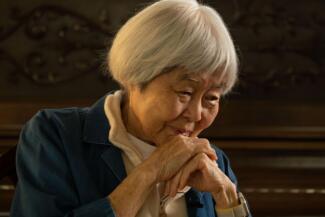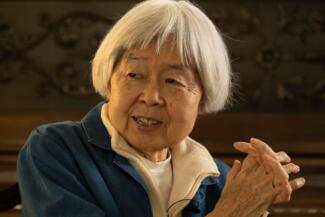Meditative, impressionistic, awe-inspiring
From the Lost and Found Department: New and Selected Poems
by Joy Kogawa
Toronto: McClelland & Stewart, 2023
$18.00 / 9780771005138
Reviewed by Marguerite Pigeon
*
 In a 2021 interview with Talks at Google, Joy Kogawa describes an emotional crisis she experienced in the 1960s. Until then, she explains, mimicking herself typing furiously, she “lived to write.” Afterwards, she wrote “to know life.” She became a poet.
In a 2021 interview with Talks at Google, Joy Kogawa describes an emotional crisis she experienced in the 1960s. Until then, she explains, mimicking herself typing furiously, she “lived to write.” Afterwards, she wrote “to know life.” She became a poet.
Sixty years have since passed. We can now hold in our hands the breadth of what flowed from Kogawa’s reckoning with writing. From the Lost and Found Department presents a new book’s worth of poems from Kogawa, an icon of Canadian writing, followed by selections from her collections A Choice of Dreams, Jericho Road, Woman in the Woods, and A Garden of Anchors.

Many readers cherish Kogawa for her fiction writing, especially the 1981 novel Obasan. It follows protagonist Naomi Nakane as she reconstructs her forcible eviction from Vancouver as a child during WWII, along with her large Japanese-Canadian family, and all the devastation and resilience that come after. Carefully researched, literary, the novel also closely parallels the brutal expulsion of Kogawa’s own family.

Obasan is a triumph, a touchstone of Canadian fiction. Yet Kogawa makes room in her story for Naomi’s seemingly ephemeral dreams, as in this sequence involving an image of a mysterious woman: “She begins to speak but the words are so old they cannot be understood. There is a calmness in her face as she recites an ancient mythical contract made between herself and the man so long ago the language has been forgotten.”
Readers of Kogawa’s poetry are privy to a singular pleasure: we follow this thread of dreams further away from narrative, deeper into Kogawa’s memory, as well as into myth and what seems unsayable. In From the Lost and Found Department, we witness a poet’s life’s work as she balances reality with dreamlife; experience with a cosmic awareness inflected by Christian lore.
From Kogawa’s first chapbook, The Splintered Moon (1967), here is “Owned a Pain”:
I owned a pain which I kept
Beneath my ribs and thought
If I could see the pain
I would know release
But I could not because I’m not
Made of plastic so I asked the surgeon
To cut it out and let me see its shape.
He sliced me apart and I saw
The multi-pronged red wherefore within
And I bartered my bloody star
For a pointless package of peace.
An early poem that sets some terms for Kogawa’s poetics: unflinching, unsentimental, bodily, and prepared to meditate deeply on violence (whether inflicted from without or within) until it yields self-knowledge. The poem suggests we must accept that pain cannot be excised; we are made of it.
While plainspoken, Kogawa’s writing is often enigmatic. Her spare lines and unusual enjambments act as pathways; the reader enters, explores, emerges with a feel for the space of the poem itself. Each stands as a careful, oblique object of attention. Social pretext may scaffold a poem, but it is within, in the viscera and psyche, that Kogawa is most at home, as in “Tea Party”:
When birds dance for instance
Heads cocked, wings spread
Leaping back and forth, tearing turf
Instead of feathers
And we are polite and elegant
Sipping tea with steady hands
The wings beating beneath
Our ribs behind our eyes
Kogawa handles many of life’s main events in this manner—from giving birth and marriage, to love, sex, death, and cultural ritual. Few poems follow narrative logic. Rather, they thread along Kogawa’s unique life-way and thought-ways, through her areas of curiosity. From “At Jindaiji Temple Fishing Pond”:
Rooting for the smooth grey fish
Being hooked and snared by laughing child
And powerless in the cool grey weather
To leap out of one element into another
Wishing only to avoid the death
Of being hooked on my gills by some cosmic child
Kogawa frequently evokes the physical world, including animals, forests, and insects. The latter are allusive: spiders suggest human predation; ants get surreal treatment, while flies stand in for distraction: “insomnia is a parade of pests / a thin-veined post-midnight / buzz in the room jolts me awake” (from “Or Poor Co-ordination”).
A particularly rich sequence called The Wedlocked, in the 1977 collection Jericho Road, treats a couple’s divorce impressionistically, with attention to the contours of feeling and the humanity of severed relationships:
Wild Rose Bush
in the middle of our constant
penultimate argument he
went to the wild thorn bush
in the tame garden to
pick the rose, tugging and twisting but
finally, leaving it there he returned
and sat beside me, coughing softly while
the bent branch of the injured bush
moved with imperceptible grace
in the elastic afternoon
This flexibility of time is Kogawa’s kind of optimism. Precisely in our greatest moments of sorrow, it suggests, life might offer a new angle from which to view ourselves.
In the poem “Give Us This Day,” a narrator describes scenes of suffering, frustration and “bottlenecks” of pain. To consider these, Kogawa turns to the biblical figure of Shadrach. In Christian mythology, Shadrach’s faith allows him to enter a fiery furnace and emerge unharmed. The poem asks what can fix scenes of human agony:
The answer lies at the heart of the flame
in the hour of suffocation
or the waiting game.
Shadrach’s angel will find us
in the heart’s fiery places.
Here, Kogawa seems to say we have no hope of synthesizing experience into meaning, or redemption, without risking pain.
Perhaps this is why, in Kogawa’s work, the body is so often present, as dung, sweat, latrines, blood, and physical trouble, like coughing and sleeplessness, return, keeping the reader in mind of the flesh—its limits, the way it nags even in fantasy (from “Laryngitis”: “we form the first / microbes with our minds”). This attunement to the body’s power, its pleasures and decay, allows Kogawa to treat ugliness, as well as beauty.
Brutality and cruelty can be perpetrated by children, as in the bullies of Kogawa’s childhood. Other times, violence comes at the hands of a racist governmental regime. “What Do I Remember of the Evacuation” captures her family’s personal history in devastating reportage:
I hear there were people herded
Into the Hastings Park like cattle.
Families were made to move in two hours
Abandoning everything, leaving pets
And possessions at gunpoint.
Violence can be nearer still. Kogawa’s father, Gordon Goichi Nakayama was a pedophile who abused many children while working as an Anglican church minister. Kogawa has had to wrestle, over many decades, with the paradox of her father’s loving presence in her family and his vicious abuse towards others. Her 2016 memoir, Gently to Nagasaki, treated this struggle.
Kogawa has openly acknowledged her father’s abuse and, in media interviews, has clearly said she stands with his victims. Yet she’s also admitted some of her father’s victims shun her now because she does not repudiate the man or hate him. A poem in the newest work in From the Lost and Found Department, called “a parent’s love is deep,” touches on this difficult stance:
whatever horrors
my oya did
our triumph is
derision’s
not forever
Hard words to sit with. Hard, too, is the dedication Kogawa has chosen for From the lost and found department, which is to both her parents. Yet these choices are part and parcel of the worldview Kogawa conveys in her work, in which no one is outside the reach of love—or poetry.
Kogawa’s most recent poems come first in this new and selected. Slender, thoughtful, they often avoid uppercase lettering, as if speaking quietly into the reader’s ear as they explore Kogawa’s life in advanced age and address departed loved ones, including her parents. The poem “love is a fire” welcomes searing experience in all its intensity:
and i am a thin
green branch
wishing to be consumed
if i could love
i would be so busily burning
that when the light
is finally out
i would have had
no time
for dying
For this reader, the framework of Kogawa’s poetics is capacious enough to encompass the discomfort—or even pain—of some of her choices. From the Lost and Found Department is an awe-inspiring work from a poet who has considered hurt from all angles, and who still chooses love.
*

Marguerite Pigeon writes poetry, fiction, and reviews. Her latest publication, a book-length poem called The Endless Garment (Wolsak & Wynn), was named to The Globe and Mail’s Top 100 books list for 2021. Originally from Northern Ontario, she lives in Vancouver, where she runs a small editing and writing business, Carrier Communications. [Editor’s note: Marguerite Pigeon’s The Endless Garment is reviewed here by Heidi Greco. Pigeon has reviewed poetry by Chris Banks, Nicholas Bradley, Cecily Nicholson and Arleen Paré in BCR.]
*
The British Columbia Review
Interim Editors, 2023-24: Trevor Marc Hughes (non-fiction), Brett Josef Grubisic (fiction)
Publisher: Richard Mackie
Formerly The Ormsby Review, The British Columbia Review is an on-line book review and journal service for BC writers and readers. The Advisory Board now consists of Jean Barman, Wade Davis, Robin Fisher, Barry Gough, Hugh Johnston, Kathy Mezei, Patricia Roy, Maria Tippett, and Graeme Wynn. Provincial Government Patron (since September 2018): Creative BC. Honorary Patron: Yosef Wosk. Scholarly Patron: SFU Graduate Liberal Studies. The British Columbia Review was founded in 2016 by Richard Mackie and Alan Twigg.
“Only connect.” – E.M. Forster
One comment on “Meditative, impressionistic, awe-inspiring”